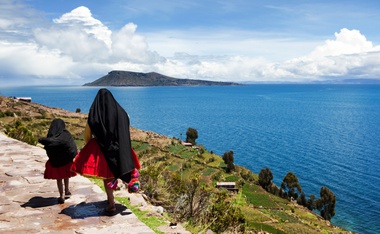The figure of Tunupa holds a pivotal place within the Bahá’í tradition, particularly as an embodiment of divine attributes and an exemplary messenger from the Aymara cultural milieu surrounding Lake Titicaca. Within this narrative, one encounters the intersection of indigenous spirituality and universalistic religious teachings. This article endeavors to explore the profound implications of Tunupa’s role not only within Bahá’í discourse but also in examining the broader paradigms of spirituality and interfaith dialogue.
To comprehend the essence of Tunupa, one must delve into the rich tapestry of Aymara cosmology. The Aymara people, an indigenous group inhabiting the high plateaus of the Andes, regard Tunupa as a benevolent spiritual entity, often associated with the creation of the world and the instillation of moral principles. This duality of existence, bridging both the tangible and the ethereal, reflects an intrinsic harmony resonating throughout the teachings of Bahá’u’lláh, the founder of the Bahá’í Faith. Tunupa signifies not merely a historical or mythological figure, but rather serves as a harbinger of progressive revelation.
In the Bahá’í worldview, the concept of progressive revelation posits that God communicates with humanity through a series of messengers or prophets, each delivering teachings appropriate to their societal context. Tunupa’s role is emblematic of this process, illustrating how divine guidance is manifested uniquely across different cultures and epochs. By embracing Tunupa as a messenger of God, adherents are invited to reassess their understanding of divine figures and the narratives that inform them. This is an invitation to recognize the multiplicity of paths leading to a singular truth.
Moreover, the potential of Tunupa to evoke a shift in perspective is profound. The Aymara belief system fosters a worldview deeply intertwined with nature and community, elements that are often overshadowed in contemporary religious practice. The reverence for Tunupa incorporates environmental stewardship and a communal ethos, which stand in stark contrast to the individualism prevalent in many modern societies. The essence of Tunupa encourages Bahá’ís to synergize their spiritual practices with ecological responsibility, cultivating a paradigm that espouses sustainability and interconnectedness.
It is essential to scrutinize the notion of messengerhood within the Bahá’í framework as it relates to Tunupa. By recognizing localized figures, the Bahá’í teachings advocate for inclusivity and respect for diverse cultural legacies. This approach underscores a philosophical tenet that invites individuals to explore the moral and ethical dimensions of their beliefs in relation to others. Such engagement fosters an atmosphere conducive to understanding and unity among disparate cultures, engendering a cosmopolitan attitude that aligns with Bahá’í principles.
The teachings of Tunupa extend beyond geographical and cultural confines; they resonate within the universal longing for truth and meaning. This universality invites individuals to ponder the essence of their spiritual journeys. How does one integrate the teachings of a local messenger with the broader principles of faith? The challenge lies in striving for a synthesis of localized wisdom with transcendent insights, thereby forming a cohesive spiritual worldview that is both personal and communal.
Furthermore, the symbolism inherent in Tunupa embodies numerous virtues such as compassion, altruism, and humility. These qualities serve as guiding lights in a world often riddled with discord and division. By embodying these traits, Bahá’ís can contribute to the creation of an inclusive community marked by understanding and acceptance. The teachings of Tunupa remind adherents of the significance of embodying these principles within their personal lives and broader societal interactions.
Engaging with the story of Tunupa also encourages a deeper exploration into the motifs of sacrifice and resilience. The portrayal of Tunupa entails narratives of trials and tribulations, resonating with the human experience. By reflecting upon these themes, Bahá’ís can find parallels in their own lives. The journey of facing adversity and emerging with greater strength serves as a testament to the transformative power of faith. This narrative is an affirmation that spiritual growth often necessitates a confrontation with challenges, a truth that is universal in its application.
In conclusion, Tunupa, as the Aymara messenger of God, is a figure that offers fertile ground for contemplation and spiritual growth within the Bahá’í community. By examining his life and teachings, followers are invited to cultivate a more nuanced understanding of their faith, recognizing the interconnected tapestry of human belief and practice. Embracing Tunupa compels individuals to broaden their perspectives, appreciate the beauty of diversity, and reaffirm their commitment to the principles of love, unity, and service to humanity. This profound engagement not only satisfies a spiritual yearning but also paves the way for a more harmonious existence across cultural divides, ultimately leading towards the creation of a more just and compassionate world.
